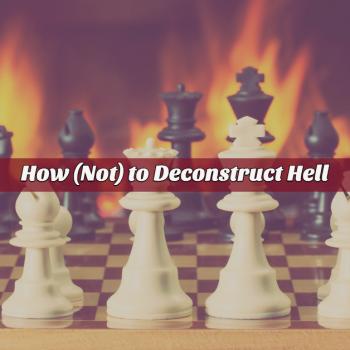Below is an excerpt from Scot McKnight about former blog contributor, Ed Fudge‘s book Hell: A Final Word. Scot’s review is brief, but worth looking at. He says the following in describing Fudge’s approach:
The traditional view of hell rests on four pillars: that the OT says nothing; that the Jewish view at the time of Jesus was one of eternal conscious punishment; that Jesus’ view was thoroughly Jewish; and that the NT authors follow Jesus.
He goes on to describe the book, section by section, in summary fashion. He doesn’t give much in the way of his opinion on the book, but simply gives us the basics of the argument [so, don’t read this post and think: Soooo…. Scot McKnight agrees/disagrees with Ed Fudge on Conditionalism]. He says:
1. Gehenna, Jesus’ typical term, is a trope for the place of destruction/fire south of Jerusalem. It cannot be proven to have been the dump in the 1st Century.
2. What happens there? The wicked are destroyed, they perish there. Matt 10:28: “fear Him who is able to destroy both soul and body in hell/Gehenna.” The issue is if “destroy” means “destroy” or “preserve forever in a destroying state….”
3. Gnashing of teeth means anger, not pain. Cf. Acts 7:52-54.
4. Eternal punishment fits with other uses of “Eternal” as an adjective: salvation (Heb 5:6), redemption (9:1), judgment (6:2), punishment (Matt 25:46), destruction (2 Thess 1:9). Big conclusions: the term refers to something in the Age to Come, it is endless and it refers to the result of an action. An action leads to something being permanent: one is not redeemed forever, one is redeemed and then lives forever; one is not judged forever, one is judged and then has consequences forever….
5. Rich man and Lazarus: it’s a parable; Fudge sees Jewish folklore at work here; it’s Hades not Gehenna; this parable says nothing about hell; it’s not literal; it aims to motivate Jesus’ contemporaries to care for the poor with the threat of irreversible consequences…












